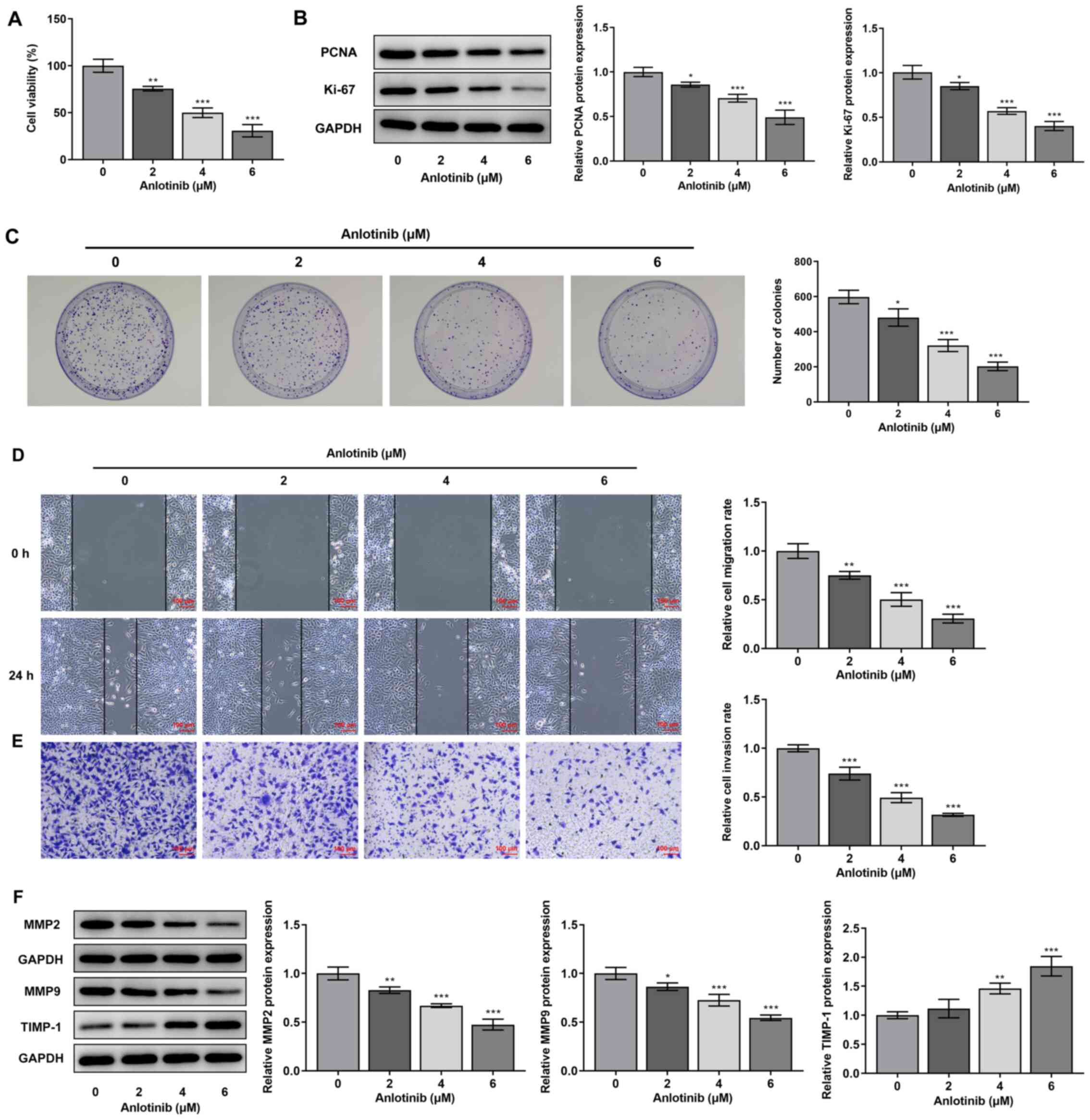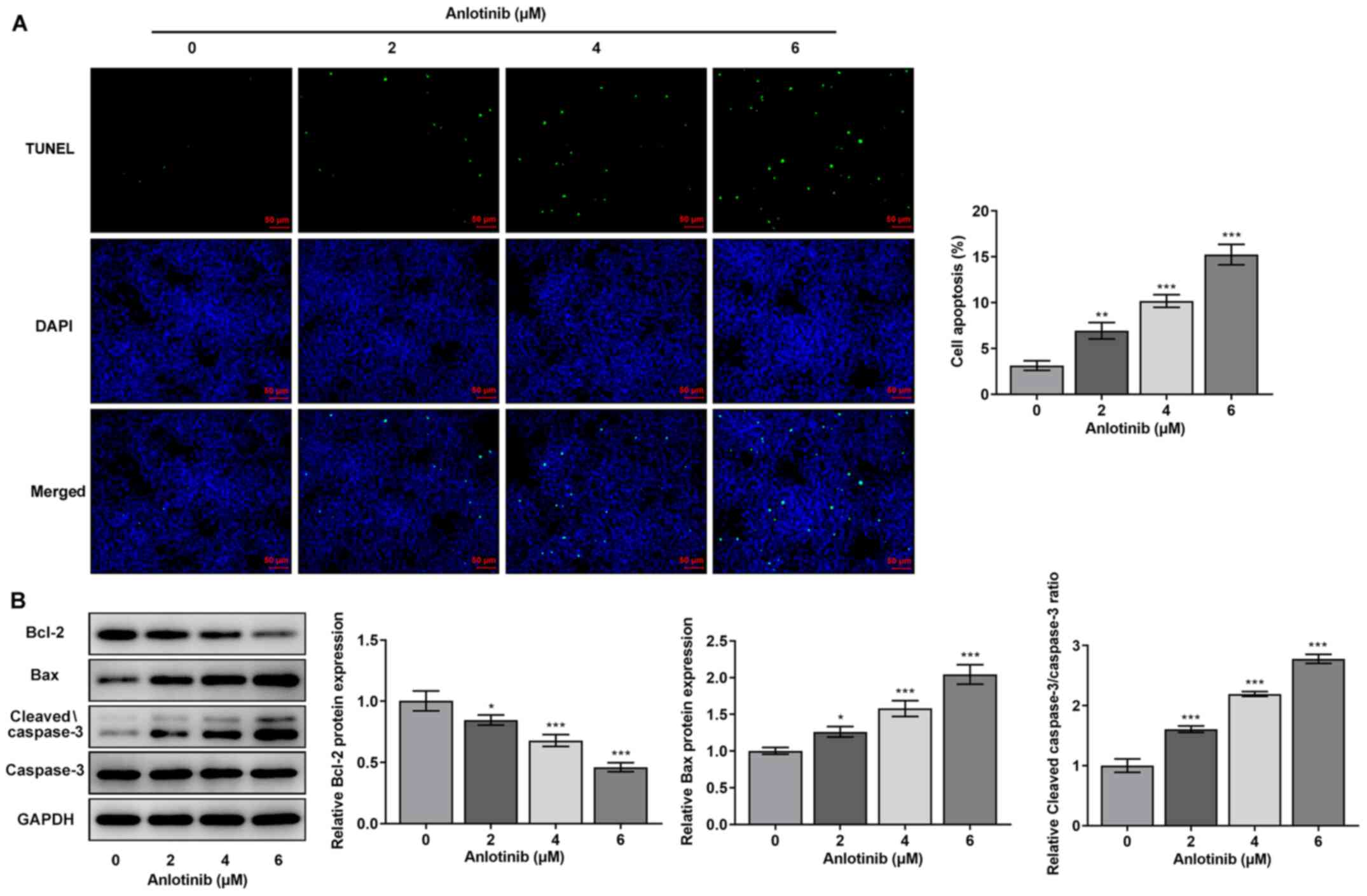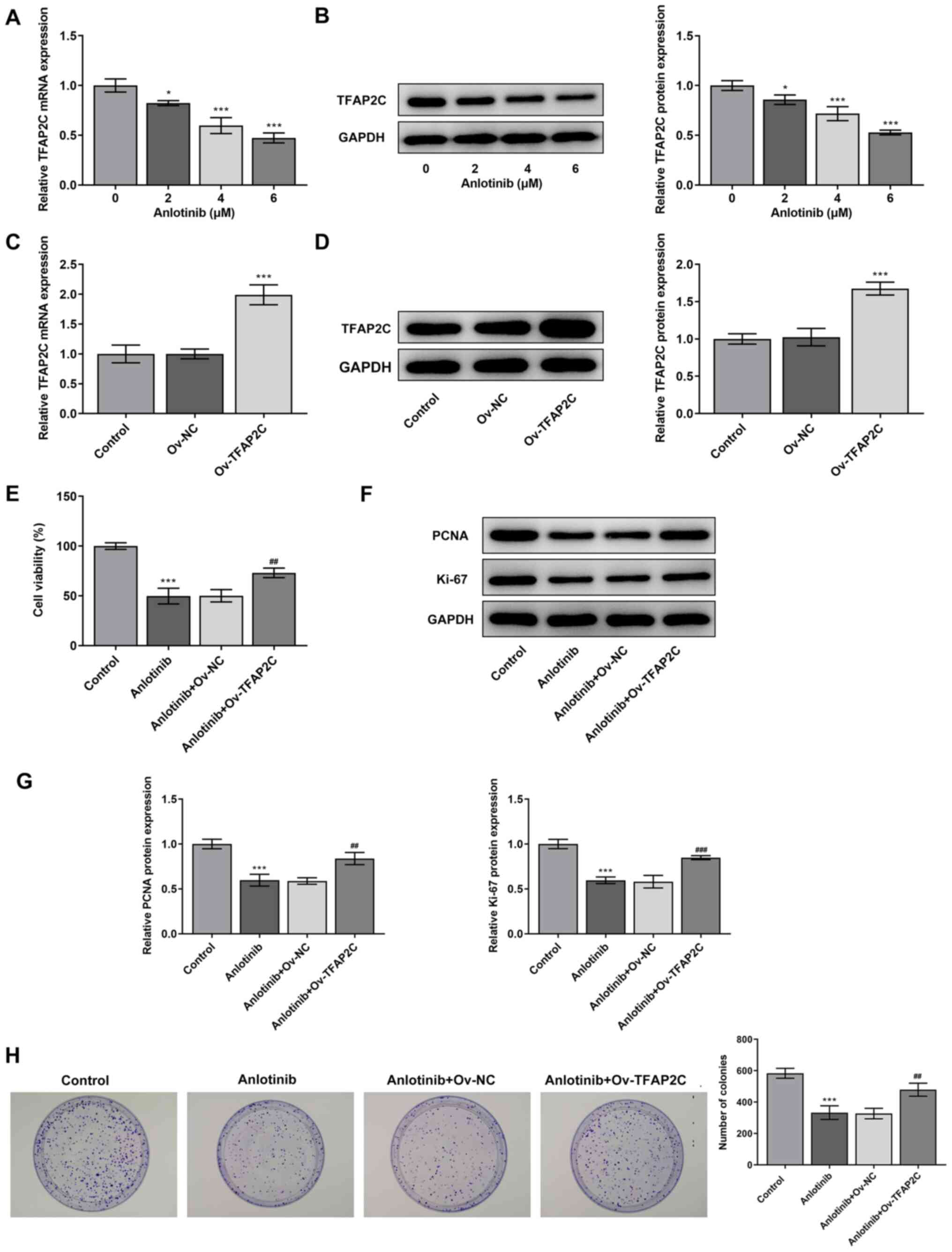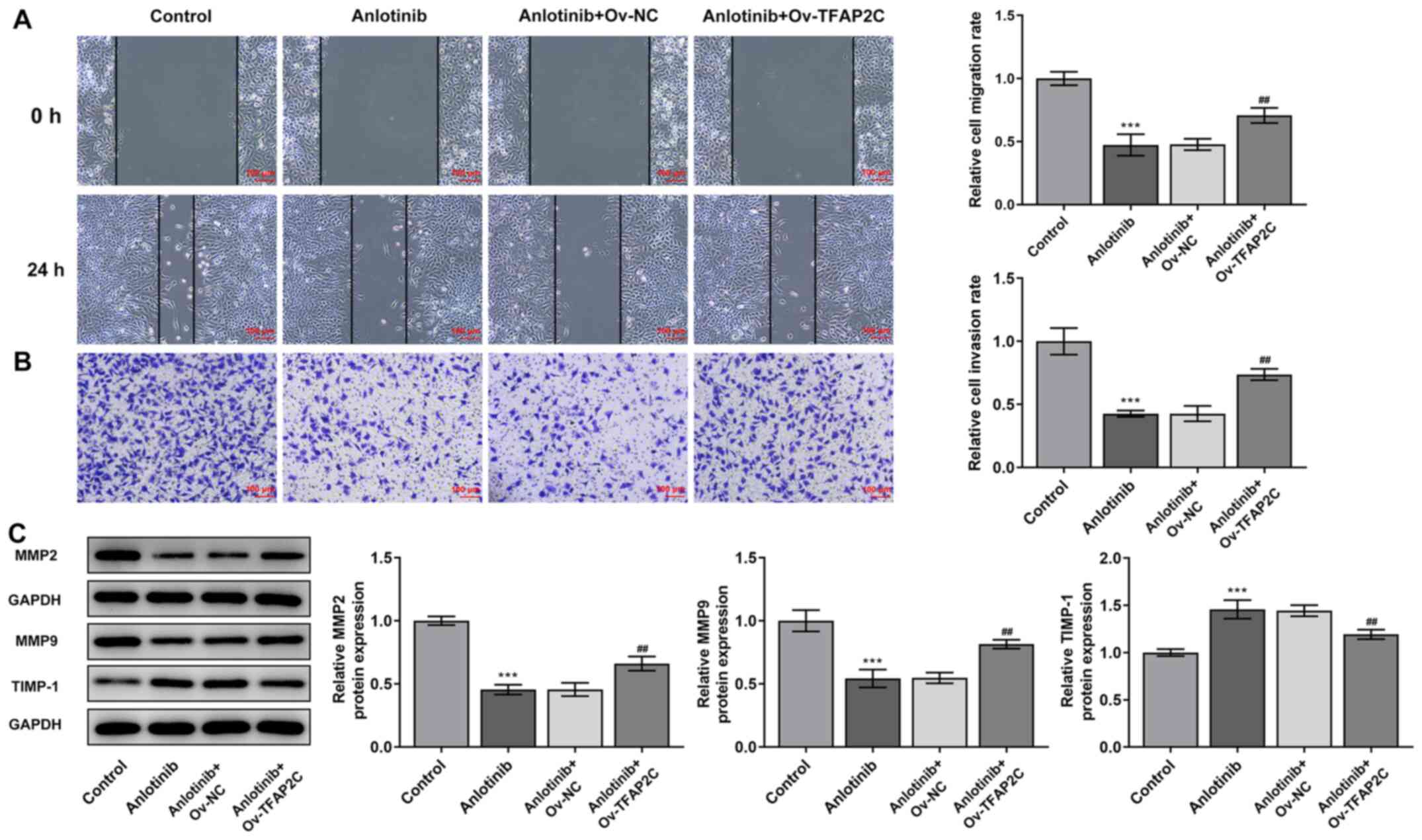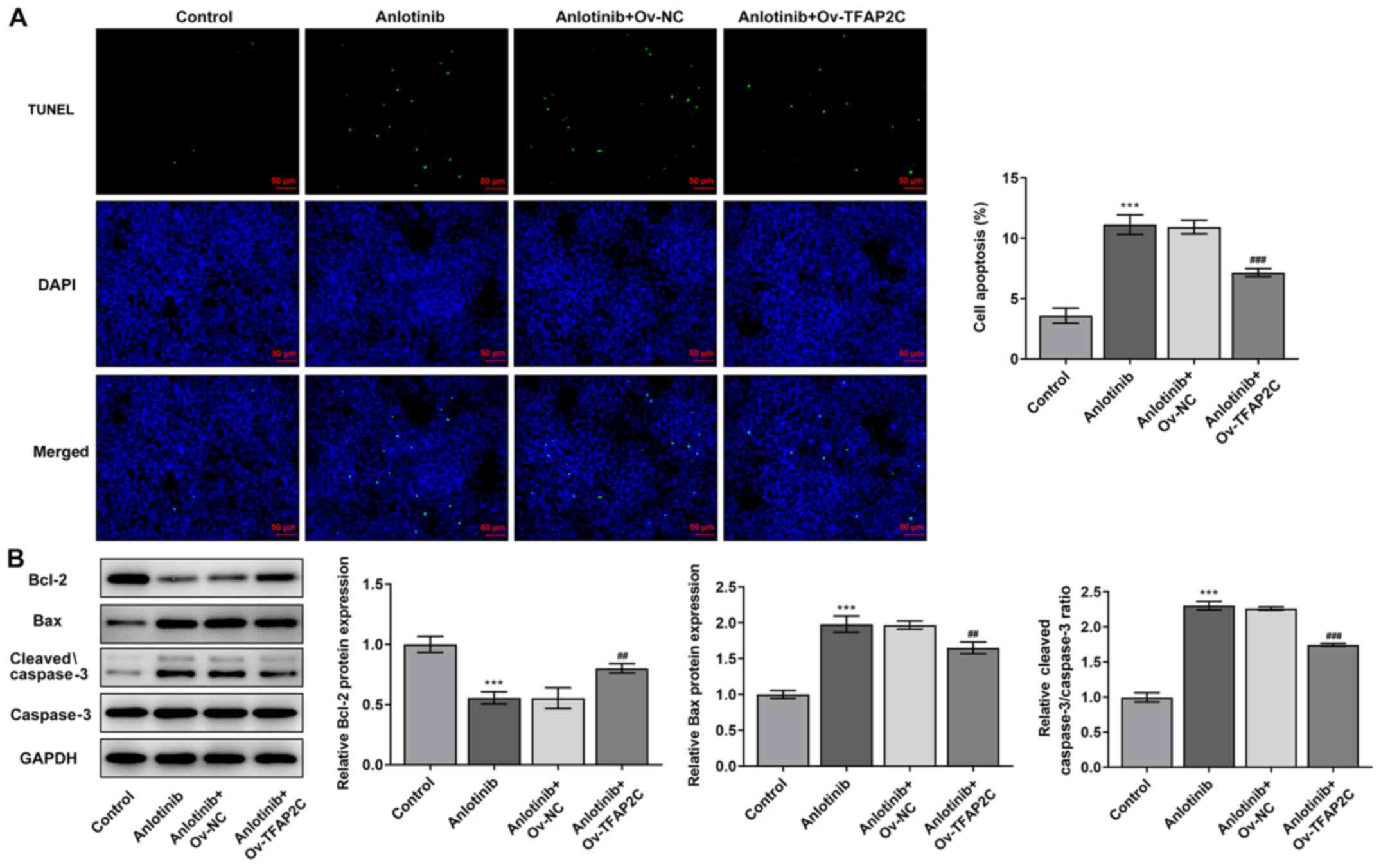|
1
|
DeSantis C, Siegel R, Bandi P and Jemal A:
Breast cancer statistics, 2011. CA Cancer J Clin. 61:409–418. 2011.
View Article : Google Scholar : PubMed/NCBI
|
|
2
|
Tajima T, Tokuda T and Kubota M: Treatment
of advanced breast cancer: current issues. Cancer and Chemotherapy.
25:1832–1840. 1998.(In Japanese). PubMed/NCBI
|
|
3
|
Maughan KL, Lutterbie MA and Ham PS:
Treatment of breast cancer. Am Fam Physician. 81:1339–1346.
2010.PubMed/NCBI
|
|
4
|
Yang J, Yan J and Liu B: Targeting
VEGF/VEGFR to modulate antitumor immunity. Front Immunol.
9:9782018. View Article : Google Scholar : PubMed/NCBI
|
|
5
|
Jiao Q, Bi L, Ren Y, Song S, Wang Q and
Wang YS: Advances in studies of tyrosine kinase inhibitors and
their acquired resistance. Mol Cancer. 17:362018. View Article : Google Scholar : PubMed/NCBI
|
|
6
|
Kerbel RS: Strategies for improving the
clinical benefit of antiangiogenic drug based therapies for breast
cancer. J Mammary Gland Biol Neoplasia. 17:229–239. 2012.
View Article : Google Scholar : PubMed/NCBI
|
|
7
|
Gao Y, Liu P and Shi R: Anlotinib as a
molecular targeted therapy for tumors. Oncol Lett. 20:1001–1014.
2020. View Article : Google Scholar : PubMed/NCBI
|
|
8
|
Sun Y, Niu W, Du F, Du C, Li S, Wang J, Li
L, Wang F, Hao Y, Li C, et al: Safety, pharmacokinetics, and
antitumor properties of anlotinib, an oral multi-target tyrosine
kinase inhibitor, in patients with advanced refractory solid
tumors. J Hematol Oncol. 9:1052016. View Article : Google Scholar : PubMed/NCBI
|
|
9
|
Syed YY: Anlotinib: First global approval.
Drugs. 78:1057–1062. 2018. View Article : Google Scholar : PubMed/NCBI
|
|
10
|
Han B, Li K, Wang Q, Zhang L, Shi J, Wang
Z, Cheng Y, He J, Shi Y, Zhao Y, et al: Effect of anlotinib as a
third-line or further treatment on overall survival of patients
with advanced non-small cell lung cancer: The ALTER 0303 Phase 3
Randomized Clinical Trial. JAMA Oncol. 4:1569–1575. 2018.
View Article : Google Scholar : PubMed/NCBI
|
|
11
|
Li L, Yu J, Jiao S, Wang W, Zhang F and
Sun S: Vandetanib (ZD6474) induces antiangiogenesis through
mTOR-HIF-1 alpha-VEGF signaling axis in breast cancer cells.
OncoTargets Ther. 11:8543–8553. 2018. View Article : Google Scholar : PubMed/NCBI
|
|
12
|
De Andrade JP, Park JM, Gu VW, Woodfield
GW, Kulak MV, Lorenzen AW, Wu VT, Van Dorin SE, Spanheimer PM and
Weigel RJ: EGFR is regulated by TFAP2C in luminal breast cancer and
is a target for vandetanib. Mol Cancer Ther. 15:503–511. 2016.
View Article : Google Scholar : PubMed/NCBI
|
|
13
|
Hu N, Si Y, Yue J, Sun T, Wang X, Jia Z,
Gao S, Li Q, Shao Y, Wang J, et al: Anlotinib has good efficacy and
low toxicity: A phase II study of anlotinib in pre-treated HER-2
negative metastatic breast cancer. Cancer Biol Med. 18:849–859.
2021. View Article : Google Scholar : PubMed/NCBI
|
|
14
|
Zhang Y, Wu D, Zhao B, Tian XL, Yao TC, Li
F, Liu WF and Shi AP: Application of neoadjuvant chemotherapy
combined with anlotinib in occult breast cancer: A case report and
review of literature. World J Clin Cases. 9:919–926. 2021.
View Article : Google Scholar : PubMed/NCBI
|
|
15
|
Bogachek MV, Chen Y, Kulak MV, Woodfield
GW, Cyr AR, Park JM, Spanheimer PM, Li Y, Li T and Weigel RJ:
Sumoylation pathway is required to maintain the basal breast cancer
subtype. Cancer Cell. 25:748–761. 2014. View Article : Google Scholar : PubMed/NCBI
|
|
16
|
Sotiriou C, Wirapati P, Loi S, Harris A,
Fox S, Smeds J, Nordgren H, Farmer P, Praz V, Haibe-Kains B, et al:
Gene expression profiling in breast cancer: Understanding the
molecular basis of histologic grade to improve prognosis. J Natl
Cancer Inst. 98:262–272. 2006. View Article : Google Scholar : PubMed/NCBI
|
|
17
|
Sørlie T, Perou CM, Tibshirani R, Aas T,
Geisler S, Johnsen H, Hastie T, Eisen MB, van de Rijn M, Jeffrey
SS, et al: Gene expression patterns of breast carcinomas
distinguish tumor subclasses with clinical implications. Proc Natl
Acad Sci USA. 98:10869–10874. 2001. View Article : Google Scholar : PubMed/NCBI
|
|
18
|
Gu C, Zou S, He C, Zhou J, Qu R, Wang Q,
Qi J, Zhou M, Yan S and Ye Z: Long non-coding RNA CCAT1 promotes
colorectal cancer cell migration, invasiveness and viability by
upregulating VEGF via negative modulation of microRNA-218. Exp Ther
Med. 19:2543–2550. 2020.PubMed/NCBI
|
|
19
|
Sui C, Liu D, Hu Y and Zhang L:
MicroRNA-708-5p affects proliferation and invasion of osteosarcoma
cells by targeting URGCP. Exp Ther Med. 17:2235–2241.
2019.PubMed/NCBI
|
|
20
|
Wang Y, Liu M, Chen S and Wu Q:
Plantamajoside represses the growth and metastasis of malignant
melanoma. Exp Ther Med. 19:2296–2302. 2020.PubMed/NCBI
|
|
21
|
Livak KJ and Schmittgen TD: Analysis of
relative gene expression data using real-time quantitative PCR and
the 2(−Delta Delta C(T)) method. Methods. 25:402–408. 2001.
View Article : Google Scholar : PubMed/NCBI
|
|
22
|
Bray F, Ferlay J, Soerjomataram I, Siegel
RL, Torre LA and Jemal A: Global cancer statistics 2018: GLOBOCAN
estimates of incidence and mortality worldwide for 36 cancers in
185 countries. CA Cancer J Clin. 68:394–424. 2018. View Article : Google Scholar : PubMed/NCBI
|
|
23
|
Plichta JK, Thomas SM, Vernon R, Fayanju
OM, Rosenberger LH, Hyslop T, Hwang ES and Greenup RA: Breast
cancer tumor histopathology, stage at presentation, and treatment
in the extremes of age. Breast Cancer Res Treat. 180:227–235. 2020.
View Article : Google Scholar : PubMed/NCBI
|
|
24
|
Gouri A, Benarba B, Dekaken A, Aoures H
and Benharkat S: Prediction of late recurrence and distant
metastasis in early-stage breast cancer: Overview of current and
emerging biomarkers. Curr Drug Targets. 21:1008–1025. 2020.
View Article : Google Scholar : PubMed/NCBI
|
|
25
|
Woolston C: Breast cancer. Nature.
527:S1012015. View
Article : Google Scholar : PubMed/NCBI
|
|
26
|
Franke CM, Gu VW, Grimm BG, Cassady VC,
White JR, Weigel RJ and Kulak MV: TFAP2C regulates carbonic
anhydrase XII in human breast cancer. Oncogene. 39:1290–1301. 2020.
View Article : Google Scholar : PubMed/NCBI
|
|
27
|
Woodfield GW, Horan AD, Chen Y and Weigel
RJ: TFAP2C controls hormone response in breast cancer cells through
multiple pathways of estrogen signaling. Cancer Res. 67:8439–8443.
2007. View Article : Google Scholar : PubMed/NCBI
|
|
28
|
Perkins SM, Bales C, Vladislav T, Althouse
S, Miller KD, Sandusky G, Badve S and Nakshatri H: TFAP2C
expression in breast cancer: Correlation with overall survival
beyond 10 years of initial diagnosis. Breast Cancer Res Treat.
152:519–531. 2015. View Article : Google Scholar : PubMed/NCBI
|
|
29
|
Wu VT, Kiriazov B, Koch KE, Gu VW, Beck
AC, Borcherding N, Li T, Addo P, Wehrspan ZJ, Zhang W, et al: A
TFAP2C gene signature is predictive of outcome in HER2-positive
breast cancer. Mol Cancer Res. 18:46–56. 2020.PubMed/NCBI
|
|
30
|
Spanheimer PM, Woodfield GW, Cyr AR, Kulak
MV, White-Baer LS, Bair TB and Weigel RJ: Expression of the RET
proto-oncogene is regulated by TFAP2C in breast cancer independent
of the estrogen receptor. Ann Surg Oncol. 20:2204–2212. 2013.
View Article : Google Scholar : PubMed/NCBI
|
|
31
|
Kulak MV, Cyr AR, Woodfield GW, Bogachek
M, Spanheimer PM, Li T, Price DH, Domann FE and Weigel RJ:
Transcriptional regulation of the GPX1 gene by TFAP2C and aberrant
CpG methylation in human breast cancer. Oncogene. 32:4043–4051.
2013. View Article : Google Scholar : PubMed/NCBI
|















